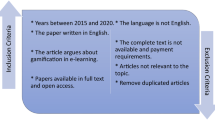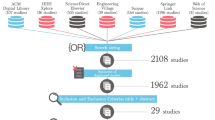Abstract
This paper is in response to the article titled “Designing and integrating purposeful learning in game play: a systematic review” by Ke (Educ Technol Res Dev 64:219–244, 2016) focusing on research, evaluation, and design. In her article, Ke’s synthesized five major themes related to the design of learning games in published academic research. These are then offered as guideposts for future research-based learning game design. However, to be more responsive to the immediate needs of educators, I contend that we should be able to speak to commercial learning games as well. My proposal is that we use Ke’s work as a starting point for commercial learning game evaluation, and more broadly, expand our research and design so that we can speak more thoughtfully about commercial games and the variety of ways they could be integrated into learning experiences.
Similar content being viewed by others
References
Gee, J. P. (2007). What video games have to teach us about learning and literacy. New York: Palgrave Macmillan.
Hirsh-Pasek, K., Zosh, J. M., Golinkoff, R. M., Gray, J. H., Robb, M. B., & Kaufman, J. (2015). Putting education in “Educational” Apps: Lessons from the science of learning. Psychological Science in the Public Interest, 16(1), 3–34. https://doi.org/10.1177/1529100615569721
Ke, F. (2016). Designing and integrating purposeful learning in game play: A systematic review. Educational Technology Research and Development, 64(2), 219–244. https://doi.org/10.1007/s11423-015-9418-1
Lee, V. R., Poole, F., Clarke-Midura, J., Recker, M., & Rasmussen, M. (2020). Introducing Coding through Tabletop Board Games and Their Digital Instantiations across Elementary Classrooms and School Libraries. In Proceedings of the 51st ACM Technical Symposium on Computer Science Education (pp. 787–793). Portland, OR: Association for Computing Machinery.
Shute, V. J., Ventura, M., & Ke, F. (2015). The power of play: The effects of Portal 2 and Lumosity on cognitive and noncognitive skills. Computers & Education, 80, 58–67. https://doi.org/10.1016/j.compedu.2014.08.013
Acknowledgements
This work was supported in part by funding from the National Science Foundation under Grant No. 1837224. The opinions expressed herein are those of the authors and do not necessarily reflect those of the National Science Foundation. The author thanks the reviewers and Andri Ioannou for their comments.
Author information
Authors and Affiliations
Corresponding author
Ethics declarations
Conflict of interest
There are no conflicts of interest.
Ethical approval
The work reported in this manuscript complies with ethical standards.
Human and animal rights
This does not directly report on any human subjects.
Additional information
Publisher's Note
Springer Nature remains neutral with regard to jurisdictional claims in published maps and institutional affiliations.
Rights and permissions
About this article
Cite this article
Lee, V.R. Let’s cut to commercial: where research, evaluation, and design of learning games should go next. Education Tech Research Dev 69, 145–148 (2021). https://doi.org/10.1007/s11423-020-09865-3
Accepted:
Published:
Issue Date:
DOI: https://doi.org/10.1007/s11423-020-09865-3




